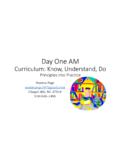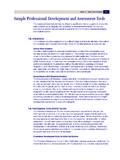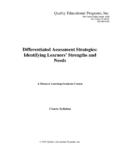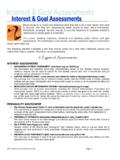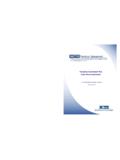Transcription of 3/12/2012 The Role of Assessment in Differentiation
1 3/12/2012 1 The Role of Assessment in Differentiation SGIS Conference Zug, Switzerland March 9-10, 2012 Carol Ann Tomlinson William Clay Parrish, Jr. Professor University of Virginia Goals for the Session 1)To explore the power of Assessment to address students varied needs. 2) To analyze the curriculum/ Assessment , instruction/management sequence. 3)To discuss questions, practices, observations. Differentiation Mindset Environment Curriculum Assessment Instruction Leadership & Management Key Elements of Differentiated Instruction 3/12/2012 2 THE HALLMARK OF EFFECTIVE TEACHING Environment, Curriculum, Assessment , Instruction & Leadership/Management Working Together Judgmental In contrast to my desire to be an advocate Distasteful Interruptive About grades Self-defense with parents An element of gotcha teaching An element of reward/punishment (If you do/don t study, do your homework, listen in ) Summative Improvisational Largely formative About feedback, not grades Done with students, not to them A seamless part of instruction (vs.
2 Interruptive) The compass of daily instructional planning A way to guide students to take charge of their own learning Teaching for success (vs. gotcha teaching) A direct reflection and measure of KUDs 3/12/2012 3 What s the learning target (KUDs)? What prerequisite skills am I assuming students have? Where is everyone in relation to the KUDs (& prerequisite skills)? What am I going to do with the information I get to move everyone forward in UNDERSTANDING as well as knowledge & skills? How will I keep track of everyone s progress? How can I involve student in more fully understanding & investing in their growth? How can Assessment help students better understand how DI works and how they can best contribute to their own success? Where should students be right now? (KUDS) Next Step? What tools? Pre- Assessment Instructional Sequence Strategies/Mgmt small group instr. contracts tiering varied homework varied resources giving directions monitoring movement etc.
3 Who s where? Assessment for Instructional Planning 3/12/2012 4 What must students KNOW UNDERSTAND BE ABLE TO DO What prerequisite knowledge, understanding, & skill are you assuming students have? Sense & Meaning Necessary for Learning. Critical for application, transfer, creation. STEP 1 Clear KUDs Planning a Focused Curriculum Means At the Very Least Clarity About What Students Should .. KNOW Facts Vocabulary Definitions UNDERSTAND Principles/ generalizations Big ideas of the discipline BE ABLE TO DO Processes Skills KNOW Facts, names, dates, places, information The Swiss Cantons Winston Churchill 1066 The elements of literature The multiplication tables Procedural information (how ) How the periodic table is useful 3/12/2012 5 BE ABLE TO DO Skills (basic skills, skills of the discipline, skills of independence, social skills, skills of production) Verbs or phrases (not the whole activity) Analyze Solve a problem to find perimeter Write a well supported argument Evaluate work according to specific criteria Contribute to the success of a group or team Use graphics to represent data appropriately UNDERSTAND Essential truths that give meaning to the topic Stated as a full sentence Begin with, I want students to understand (not or or WHAT) Multiplication is another way to do addition.
4 People migrate to meet basic needs. All cultures contain the same elements. Entropy and enthalpy are competing forces in the natural world. Voice reflects the author. 3/12/2012 6 Alignment between the KUDs (including the intent/crux of the lesson/sequence/unit is imperative!!!! Translation: We have to know at the outset where students should end up and what they should be able to do with what they ve learned when they get Where should students be right now? (KUDS) Next Step? What tools? Pre- Assessment Instructional Sequence Strategies/Mgmt small group instr. contracts tiering varied homework varied resources giving directions monitoring movement etc. Who s where? Assessment for Instructional Planning 3/12/2012 7 the intent of the teachers who developed these Idea: Where people live affects how people live. 1)Unpack the idea. What does it mean to you. 2)Support the idea with examples or argue against it with specific examples.
5 3) How might the idea apply to you or your family? 3) Where do you think we might be going with this idea? A Pre- Assessment Focused on a Big Idea or Principle 3/12/2012 8 Show (sketch an example) Tell (explain your example) 1. 1. 2. 2. Please draw two examples of how living things depend on one another and their environment. Then explain how your example shows that idea. Pre- Assessment in Fourth Grade Science 1. Please explain anything you know about the words below. Producer _____ Consumer _____ Decomposer _____ Ecosystem _____ Organism _____ how these words relate to one another or how they go together. _____ _____ What do you think the KUDs are for the lesson assessed here? Mesopotamia Geography Economy Lifestyle Select 2 and explain how they are connected What s the understanding reflected in this example? 3/12/2012 9 High School Biology Interest Survey Directions: I ll be a better teacher for you if I understand some of your interests.
6 In each box below, place an interest of yours. Write briefly about how you are involved with that interest. Note also any ways you can think of that the interest might connect with science. Interest: Experience w/ it?: Connection w/ Science? Interest: Experience w/ it? Connection w/ Science? Interest: Experience w/ it? Connection w/ Science? Interest: Experience w/ it? Connection w/ science? Example of a brief secondary interest pre- Assessment . Directions: Complete the chart to show what you know about fractions. Write as much as you can. Definition Information Examples Non-Examples Irony Useful for pre- Assessment & formative Assessment of readiness in many grades & subjects English 9 Concept: Conflict Lesson Topic: Historical Fiction STUDENTS WILL UNDERSTAND Conflicts are universal. Conflicts in literature often reflect conflicts in history and in our lives. Conflicts drive action. Conflict brings about both progress and destruction.
7 STUDENTS WILL KNOW The definition and types of conflict The elements of fictional stories The Resolution of Conflict model The importance of historical conflict in literature STUDENTS WILL BE ABLE TO Identify the conflicts in literature historical and personal events Apply the resolution of conflict model to literary, historical and personal conflicts Analyze and evaluate the actual and possible outcomes of literary historical and personal conflicts Hypothesize cause and effect relationships. 3/12/2012 10 Middle Grades English Pre- Assessment What is conflict? Describe one conflict from a movie, TV show or story you ve seen/heard recently. Why do you remember it? Describe and explain a conflict that s occurred in your personal life. What happened and how did it resolve? What are its lingering effects? Where should students be right now? (KUDS) Next Step? What tools? Formative Assessment Instructional Sequence Strategies/Mgmt small group instr.
8 Contracts tiering varied homework varied resources giving directions monitoring movement etc. Who s where? Assessment for Instructional Planning How will the student work with the ideas? 3/12/2012 11 Effective Formative Assessment : Is a process, not an instrument. Is about feedback to the teacher and students. Has the purpose of helping teachers plan more effectively to reduce the gap between where a student is relative to important learning goals and where the student needs to be. Results in proactive rather than reactive teaching. Engages students in understanding their own proximity to key goals and in developing the skills and attitudes necessary to support their own learning success. Is an essential element in developing a growth or incremental mindset in both students and teachers. Heritage, M. (2010). Formative Assessment & next generation Assessment systems: Are we losing an opportunity. A paper prepared for the Council of Chief State School Officers.
9 EXIT CARDS On your exit card--- Explain the difference between simile and metaphor. Give some examples of each as part of your explanation. Give an example of a conflict in a TV show or movie you have watched. Explain why it s a conflict. Write about a conflict you have experienced in your own life. Explain whether or not it was resolved. Describe any lingering effects of the conflict. 3/12/2012 12 3 key reasons (other than Pearl Harbor) that caused the to become involved in World War II. of the three was most important in causing the to become involved in World War II. Be sure to explain why you feel it was the most important. A Formative Assessment in Art What is perspective? One of a variety of methods artists use to create depth and dimension What techniques do artists use to create perspective in drawing? Show an example of perspective? Explain technique(s) you used to create perspective in your portfolio drawing and why you chose it/them.
10 Exit Card Say It in a Sentence: What do you think Marley is trying to get Scrooge to see, understand, and/or do in the part of the play we read for today? How do you know? (Cite specific examples and textual evidence from this section.) Hockett (2011) 3/12/2012 13 Where should students be right now? (KUDS) Next Step? What tools? Assessment Instructional Sequence Strategies & Mgmt small group instr. contracts tiering varied homework varied resources assigning student groups movement in the room handling noise etc. Who s where? Assessment for Instructional Planning Instructional planning using formative Assessment information Involves two stages: 1)Determining what particular students need next in a learning sequence to keep growing 2)Deciding how to provide what s needed, (including student groupings and which instructional strategies to use) Readiness Follow-up: What these students will need next Sample answer: Correct Knowledge or Skill Gives both correctly What these students will need next Sample answer: Partial Knowledge or Skill Gives one or the other correctly What these students will need next Sample answer: Incorrect Knowledge or Skill Gives neither or is Incorrect about both Knowledge or Skill Assessed: Explain the difference between simile and metaphor.
